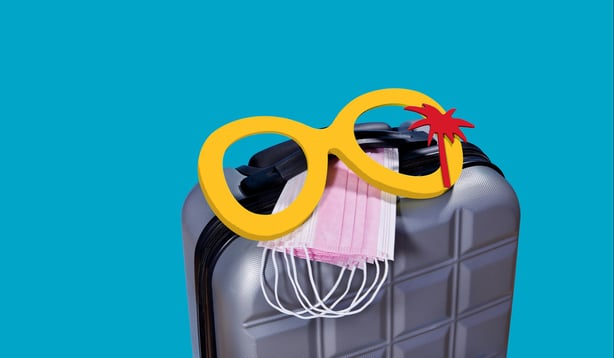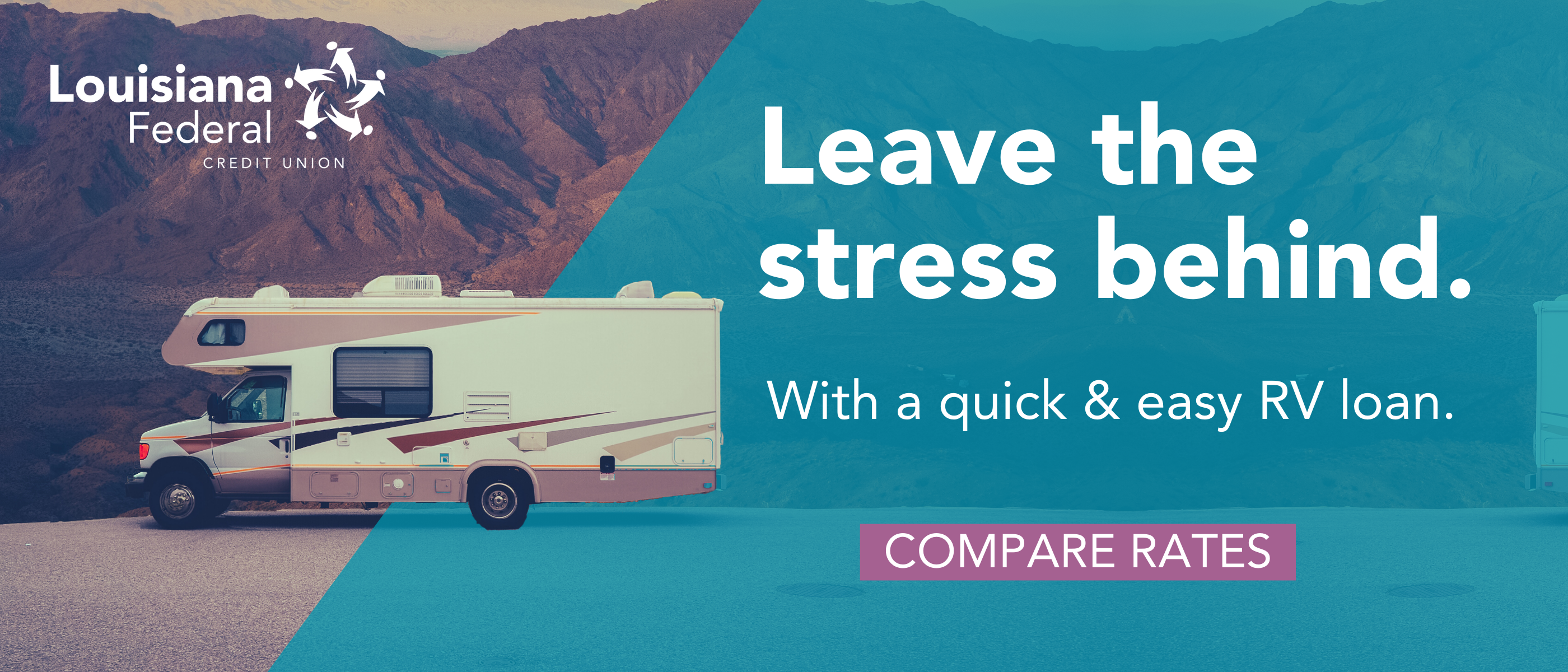
After everything 2020 has put you through, you probably need a break, right? Summer is usually the best time to leave town for a stress-free vacation. However, as COVID-19 cases continue to grow, it feels like any venture outside your home is a considerable risk. Which begs the question: Is safe travel even possible right now?
Without a vaccine it's nearly impossible to guarantee that any place other than your home is safe. But if the open road is calling you, here is a breakdown of options available to you, along with tips for making your vacation a "safecation" during the coronavirus outbreak.
First, assess the risk
Before heading out to any destination, give yourself a personal COVID-19 screening. Have you been running a fever above 100.4? Have you recently experienced shortness of breath or deep coughing? Do you have reason to believe you’ve been exposed to coronavirus in the last week? If you answer yes to any of these questions, the Centers for Disease Control (CDC) recommends you stay home.
Once you've established that you won't spread the virus, do some research about your destination so you're not caught off guard. Check the local laws of locations you'll be passing through. Some local governments have enacted strict quarantine laws for visitors entering their state from places that are experiencing a surge in new COVID-19 cases. There may encounter different rules about face coverings and public gatherings from state-to-state. While you're at it, familiarize yourself with the rules at rest stops you’ll visit along the way. You can look up COVID-19 state regulations here.
You should also plan around worst-case scenarios. If for some reason you're forced into quarantine when you return, can you miss work or work remotely?
Lastly, keep an eye out for potential travel scams. If you see vacation rental listings that seem too good to be true, trust your gut because it’s probably a scam.
Driving is the safest option, if you're careful
While staying home is always the safest bet, experts agree that if you must travel, road trips are the safest route. When thinking about your summer vacation, consider an affordable road trip to nearby locations you may have overlooked. There are many affordable vacation spots within driving distance of southeast Louisiana that can offer you and your family an unforgettable vacation without braving the confines of an airplane.
Stay safe on the open road by bringing snacks from home. If you have to stop for food, opt for curbside pickup or a drive-thru window. Avoid sit-down restaurants. If you need a break from driving, or just want to stretch your legs, try stopping at a rest area along the interstate. Many rest stops have open green areas situated away from crowds.
Using any public restroom will increase your risk of contracting the virus. So when nature calls, practice good hygiene and don't linger. Use toilet seat covers when available and wipe down other high-touch areas, like sink faucets, before using. Afterwards, wash your hands like crazy and scrub them with sanitizer for an extra measure of protection.
Gas stations have never been at the top of anybody's list in terms of general safety. We've already written about the financial dangers of credit card skimmers at the pump. But in a post-COVID world, fueling up now has health implications as well. Gas pumps are a high-touch surface, so make sure you have a barrier between your hands and the pump at all times. Pack disposable gloves that you can slip on before you exit your car. Pay at the pump to limit interactions with people. Once you're done, carefully remove your gloves from the inside out, throw them away and apply hand sanitizer when you re-enter the vehicle.
RVs are making a comeback
Let's be real. Social distancing is a whole lot easier when you can bring along your own personally sanitized bathroom, kitchen and bedroom. Which is exactly why folks are going all in for mankind's earliest pastime: Camping.
If you're desperate to get away, renting or buying an RV is an increasingly popular way to travel safely this summer. According to the CDC, exploring the great outdoors is a relatively safe way to remain physically active, get fresh air and reduce stress.
The best part is, you're already qualified to drive an RV. As long as the motor home is under 26,000 pounds (the average RV weighs around 5,200 lbs), you can get behind the wheel with just a standard driver's license.
To promote a safe camping environment, it is recommended that you set up your campsite at least 50 feet away from surrounding campers if there's no vegetation in between. For obvious reasons, sharing a tent, camper or motor home with someone from a different household is a risky thing to do.
Air travel is safer than you think, but still risky
At first glance, airplanes may seem like a flying tube of germs. But that’s not entirely true.
Joseph Allen, assistant professor of exposure assessment science, argues that, despite what you may think, you don’t get sick on airplanes more than anywhere else. Allen claims that while many people assume planes are a breeding ground for illness, the reality is that the required aircraft systems do a really good job of controlling airborne bacteria and viruses. Airplanes are built with high-efficiency air filters that refresh circulated air every two to three minutes, and can effectively block more than 99% of airborne microbes.
"Travelers are more likely to pick up the virus while waiting in line at airport security, at the boarding gate or in front of the luggage carousel," Allen explained.
While most viruses and other germs do not spread easily on flights, the CDC warns that social distancing can be difficult on crowded flights, which may increase your risk for exposure to the virus that causes COVID-19.
Airports and airlines are taking steps to minimize the risks of contagion with frequent intensive cleaning and sanitizing of common areas. Planes are fogged with electrostatic disinfectant that sticks to surfaces such as seat belts. Many airlines distribute disinfectant wipes to boarding passengers, and the Transportation Security Administration (TSA) has increased the size of hand sanitizer bottles permissible to bring aboard a plane from 3.4 ounces to 12.
Despite these extra measures, it’s best to continue following standard COVID-19 precautions. Face coverings should be worn at all times, as per CDC recommendations, and it’s a good idea to wipe down high-contact surfaces, like tray tables and armrests. As always, proper hand hygiene should be observed.
Hotels claim they're safe, but look for clues
Many states have lifted restrictions on hotels and vacation rentals, a gesture that screams "come and visit." Yet, it's not surprising that many travelers remain wary of sleeping in a bed that isn't their own.
If you find yourself in a situation where you have no choice but to stay somewhere overnight, there are a few ways to tell if the place you're staying meets proper cleaning standards.
"You can always tell if a hotel has been properly cleaned and disinfected by checking the bathrooms and seeing if the room is free of dust," John Marroni, owner and president of National Restoration, told Business Insider. Marroni suggests that hotels with modern cleaning policies tend to display certificates that indicate the place has been disinfected, and will always have a hand sanitizer dispenser located at the entrance of the building.
When lodging overnight, be sure to pack a generous supply of cleaning wipes that have an EPA-approved disinfectant, and scrub all high-touch surfaces at the hotel room or rental. This includes all door knobs, faucets, remote controls, light switches, counter tops and more. When in doubt, reference the CDC’s guidance on how to properly clean and disinfect.
Transportation to avoid (for now)
Cruise ships are seen as one of the riskiest ways to travel during a pandemic. The CDC just extended its no-sail order for cruise ships through September 30, 2020.
Riding the bus can make it difficult to practice social distancing. If public transportation is your only option, be sure to wear some sort of face covering and avoid touching surfaces (especially your own face).
Using ride-sharing services like Uber or Lyft can be risky, because you never know who sat in the seat before you. If you need to call an Uber, make sure you book a single-occupancy ride so you’re not packed in the back seat with complete strangers.
Play it safe at your destination
After all that travel, wouldn't it feel good to just rip off your mask and live life stress-free? Of course it would. But this is 2020, my friend. Nothing is easy anymore.
Once you’ve arrived at your vacation destination, remember to follow basic guidelines. Maintain a safe distance of at least six feet, avoid touching things, don't step into crowded places, wear a face covering at all times and build time into your schedule for frequent hand washing. Lastly, remember to take extra precautions with people who are at high risk. You may want to hug Maw Maw, but it'll have to wait till Christmas. (hopefully.)
Like this article? Subscribe to our blog for more great ways to help you stretch your dollars and live your best life.




